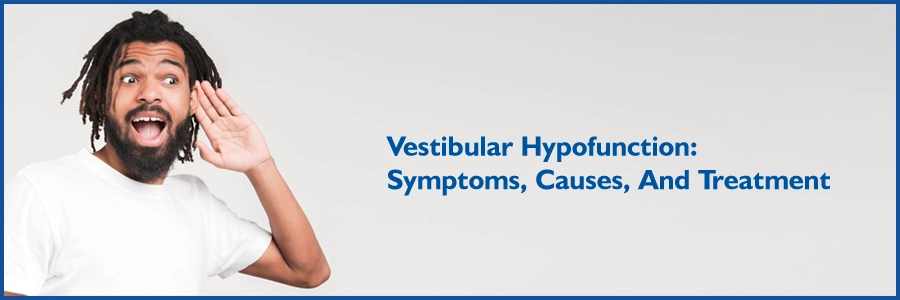
What is Vestibular Hypofunction?
Vestibular hypofunction is a condition that affects one's sense of balance. This happens when the inner ear component of the balancing system fails.
With vestibular hypofunction, the part of the inner ear that controls balance fails to work! This vestibular hypofunction disorder may affect one side of the head (unilateral hypofunction) or both sides (bilateral hypofunction).
Our ear is a complex system of bones and cartilage. It has a system of canals inside, referred to as semicircular canals. There is fluid inside the canals, and as the fluid moves, its position shifts. Our brain receives the data through a sensor in the ear, which helps us feel balanced. The vestibular system is made up of these and other small parts.
Individuals with vestibular disorders frequently suffer giddiness, which can be so severe that it affects their ability to walk,stand or maintain balance. A person may become more irritable. Let's understand more about vestibular hypofunction!
What is Vestibular Hypofunction?
Vestibular hypofunction is a condition that affects one's sense of balance. This happens when the inner ear component of the balancing system fails. The inner ear includes the vestibular system, which works with the eyes and muscles to keep the body balanced. When it stops functioning properly, the brain begins to receive error messages, which causes dizziness.
What causes vestibular balance disorders?
- Infections
- Medicines
- Problems rooted in the brain, such as traumatic brain injury
- Inner ear problems
- Calcium debris in the semicircular canals
What are the symptoms of vestibular dysfunction?
Vestibular dysfunction symptoms can differ from mild, perhaps lasting only a few seconds or minutes, to severe, resulting in total incapacity. Other symptoms may appear, and not everyone will have all of the symptoms. Some of the common symptoms of vestibular disorders include:
- Nausea
- Vertigo
- Giddiness
- Imbalance or Unsteadiness
- Lack of Coordination
- Blurred or Bouncing Vision
- Hearing Changes
- Anxiety
In addition, those with vestibular disorders may also be more sensitive to loud noises and bright lights
Secure your health with a second opinion. Make informed decisions and book your appointment today!
Get A Second OpinionHow is vestibular balance disorder diagnosed?
We may need to consult with an ear, nose, and throat expert (ENT or otolaryngologist & neurologist). Dizziness and lightheadedness are symptoms of several diseases. Other possible causes may be ruled out as part of the diagnosis. Following a review of the medical history, the healthcare professional may undertake the following:
- Hearing exam
- Eye test for nystagmus
- Blood tests
- Clinical tests of balance
- Imaging tests of the head and brain
- Look at the posture and movement using a structured exam called posturography
- VNG(Videonystagmography), SVV(Subjective Visual Vertical), DVA(Dynamic Visual Acuity).
- MRI Brain or HRCT Temporal Bone
Managing Your Care! How is vestibular balance disorder treated?
Depending on the symptoms, general health, medical history, a physical examination by an expert doctor, and the outcomes of diagnostic tests, the type of treatment recommended for the vestibular disease may be decided. Treatments for the balance issue can include:
Vestibular Rehabilitation Therapy (VRT)
A specialized form of exercise-based therapy called vestibular rehabilitation is designed to tackle both the primary and secondary symptoms of vestibular diseases. To retrain the brain, to perceive and process vestibular system signals, vestibular rehabilitation therapy (VRT) employs specialized head, body, and eye exercises. VRT exercise selection and format will vary from person to person.
Home-Based Exercise
Home workouts are usually an essential aspect of balance retraining. A physical or occupational therapist will provide the right exercises to execute at a certain pace and a progressive fitness program to boost energy and lower stress.
Medication
Depending on whether the vestibular system malfunction is in an initial, acute (lasting up to 5 days), or chronic phase, different medications are used to treat various vestibular disorders (ongoing). Pharmacological therapies may be utilized to reduce psychological comorbidity, speed up central compensation, and regulate symptoms.
Surgical Procedures for Vestibular Dysfunction
Surgery may be an option if medical therapy fails to address vertigo and other symptoms that are caused by vestibular system dysfunction. The kind of surgery done depends on the diagnosis and physical health of the patient. Surgery can be destructive or curative for peripheral vestibular diseases. Corrective surgery aims to restore or maintain the inner ear's functionality.
Yoga for Balance
Vestibular patients who practice yoga can improve their balance, concentration, movement, and coordination. There are many different yoga types, and each can have a unique effect on the health and pleasure of individuals suffering from vestibular dysfunction.
Are you battling a vestibular balance disorder?
The symptoms of vestibular balance disorder can interfere with the ability to drive, work, or enjoy recreational activities, and this can result in depression and frustration. Counseling can help people learn to manage the disease and its effects on their lives.
Ready to take control of your health journey? Book your appointment now and start your path towards wellness today!
Book an Appointment
Categories
- Cardiology 84
- Dermatology 45
- Endocrinology 33
- ENT 16
- Fertility 190
- Gastroenterology 78
- General-Medicine 81
- General 6
- Gynecology 80
- Hematology 19
- Infectious-Diseases 33
- Neurology 52
- Oncology 34
- Ophthalmology 23
- Orthopedics 69
- Pediatrics 31
- Procedure 23
- Public-Health 144
- Pulmonology 59
- Radiology 8
- Urology 68
- Wellness 161
- Woman-and-child 77